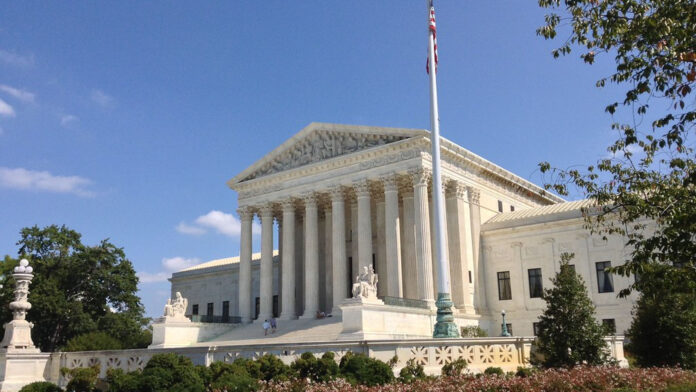Expert in legal history, constitutional law discusses plausibility of a life tenure overhaul
Imagine if a seat on the Supreme Court opened up every other year — meaning each president serving a four-year term would have the opportunity to appoint two justices in their career and each Supreme Court justice would serve an 18-year term instead of being granted life tenure.
Might instituting staggered 18-year terms insulate the justices from politics, encourage the selection of older, more experienced candidates and lessen the stakes associated with selecting a new justice? UC Davis Law Professor Carlton F.W. Larson thinks so, saying this hypothetical scenario could become a reality within our lifetime.
“I do think the current situation is not sustainable,” Larson said. “Tinkering with the Supreme Court is always tricky — … if it looks like a partisan thing, I don’t think there’s any way that it happens. But if you could get bipartisan buy-in, and one way you might do it is say, ‘This plan will take effect starting 20 years from now,’ and that way nobody really knows what particular justices it will affect or who the president will be, you would be able to deliberate about it more in a less partisan manner.”
Larson, who has been a constitutional law and legal history professor at the UC Davis School of Law for the past 15 years, is one of 63 professors from universities across the country who signed a petition released this past July that calls for an end to life tenure on the Supreme Court. Other signatories include professors from other UC law schools, but Larson is the only law professor from UC Davis to sign on.
The petition doesn’t propose an alternative solution to life-tenure — that scenario is Larson’s own hypothetical proposal — but it does take a strong stance against life tenure, stating that “continuing to concentrate power in the hands of a few individuals, who sit for many decades with almost no oversight and little incentive to compromise, is no longer good public policy, if it ever was. A court seen by most Americans as a political actor, whose very legitimacy is routinely questioned, and whose appointment process has devolved into farce, is in need of fixing.”
In more concrete and relevant terms, Larson related this discussion to the recent confirmation of Supreme Court Justice Brett Kavanaugh.
“Given how few seats there are … and the fact that people can be expected to live a lot longer now, it allows the composition of the court to turn either on pure serendipity when someone happens to die or it allows the justices to, in essence, pick their own successors by strategically timing their retirement,” Larson said. “Justice Kennedy chose to retire when there’s a Republican president and Republican Senate and that essentially guaranteed that he’d be replaced by someone like Kavanaugh. Now, if he had been settled for an 18-year term, then he would have had no ability to time the end of that.”
The debate over life tenure isn’t a new discussion, Larson said, but it has cropped up again given recent developments.
“It was certainly exacerbated by the Scalia vacancy, … Democrats were very frustrated with the failure to give a hearing to Merrick Garland and then the appointment of Gorsuch and Kavanaugh,” Larson said. “That’s coupled with a sense among many people that Trump is not legitimately the president and therefore his appointments don’t have legitimacy either. But I think even setting that aside, there’s been a general sense — probably starting way back with the Robert Bork hearing in ‘87 and to some extent with Clarence Thomas — that judicial confirmation nominations have become intensely polarized and it’s hard to imagine now a justice who would be a president of one party and confirmed by a senate of another party.”
There’s a dispute among law experts over whether an overhaul of life tenure would require a Constitutional Amendment, which would severely complicate the plausibility of instituting a new precedent. Ultimately, this topic is a discussion Larson said is worthwhile — it’s a discussion he has with his law school students and it is an issue toward which he feels strongly.
“The general idea that life tenure has become something where the benefits are significantly outweighed by the costs is something I’ve felt for a long time,” he said.
Written by: Hannah Holzer — features@theaggie.org




